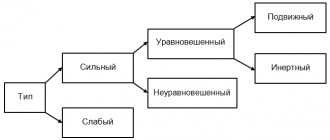The concept of the method and methodology of psychological research.
Science is, first of all, research, therefore the characteristics of science are not limited to the definition of its subject, it also includes certain of its methods.
Scientific research methods are those techniques and means by which scientists understand the subject of science, obtain reliable information, which is then used to build scientific theories and develop practical recommendations.
The strength of science largely depends on the perfection of research methods, on how valid and reliable they are, how quickly and effectively this branch of knowledge is able to perceive and use all the newest, most advanced that appears in the methods of other sciences. Where this can be done, there is usually a noticeable breakthrough in knowledge of the world.
All of the above applies to psychology. Its phenomena are so complex and unique, so difficult to study, that throughout the history of this science its successes have directly depended on the perfection of the research methods used. Over time, it integrated methods from a variety of sciences. These are methods of philosophy and sociology, mathematics and physics, computer science and cybernetics, physiology and medicine, biology and history, and a number of other sciences.
Thanks to the use of methods of natural and exact sciences, psychology, starting from the second half of the 19th century, became an independent science and began to actively develop. Until this point, psychological knowledge was obtained mainly through introspection (introspection), speculative reasoning, and observation of the behavior of other people. Analysis and reasonable generalization of this kind of life facts have played a positive role in the history of psychology. They served as the basis for the construction of the first scientific theories explaining the essence of psychological phenomena and human behavior. However, the subjectivity of these methods, their lack of reliability and complexity were the reason that psychology for a long time remained a philosophizing, non-experimental science, capable of assuming, but not proving, cause-and-effect relationships that exist between mental and other phenomena.
At the same time, due to excessively expressed theorizing, it was actually divorced from practice.
2 pages, 629 words
Classification of methods of psychological research.
... (from the Latin experimentum - test, experience) - one of the main methods of scientific knowledge in general, psychological research in particular. The distinctive features of the experiment are: 1) active intervention in ... the same persons for a long time); - a complex method (representatives of various sciences participate in the study, and, as a rule, one object is studied by different means. ...
The intention to make it a real, more or less accurate, practically useful science, not only describing, but also explaining phenomena, was associated with the introduction of laboratory experiment and measurement into it.
The concepts “method”, “methodology”, “methodology” are often not distinguished, although they have different definitions. Therefore, the essence and content of these concepts should be discussed in more detail.
Principles of conducting psychological research.
In addition to the principles of psychological science considered, in order to improve the quality of research results, it is necessary to be guided by special principles related to the process of applying methods in psychological research.
1. Principle of objectivity
. Methods of psychological research reproduce the objective process of scientific knowledge of the subject of psychology and must provide a reflection of its true essence - its laws of existence. The results of psychological research cannot change the essence and patterns of the subject being studied. The objectivity of its existence does not depend on scientific manipulations with it.
The subjective component also takes place in the construction of psychological research.
It can manifest itself in the initiation of research as such, in the freedom to choose the organizational elements of the research, in the professional competence of the researcher... However, this subjectivity must be based on the desire to obtain true research results.
It is important to choose research methods that contain a high degree of objective data.
The principle of objectivity is also manifested in the researcher’s refusal to take a conjunctural approach to the results of the study, the interpretation of which should not be adjusted to confirm the hypotheses and goals of the study.
2. Systematic principle
involves the study of a mental phenomenon as a unique system that has its own specific patterns. One of the forms of implementing a systematic approach in psychological research is a personal approach, which involves the study of a specific situation.
3. Principle of individualization
consists in revealing the uniqueness of each personality, inherent in the individual style of activity and behavior, in identifying the psychological problems of a particular individual and ways to solve them.
Basic concepts and keywords:
method, methodology, methodology, the principle of determinism, the principle of unity of the psyche and activity, the principle of development, the principle of objectivity, the principle of consistency, the principle of individualization.
Recommended reading:
1. Grinshpun I.B. Introduction to Psychology. – M., 1994.
2. General psychology: course of lectures / comp. E.I. Rogov. – M.: VLADOS, 1995.
3. Makarova L.L., Sinelnikov V.M. Zagalna psychology: basic guide - K., 2005.
4. Maksimenko S.D. The problem of method in science - K., 1982.
5. Foreign psychology: Pidruchnik / O.V. Skripchenko, L.V. Dolinska and in.. - K., 2005.
12 pages, 5595 words
1 The role of science in the development of society. Scientific activity, scientific knowledge
... the science of principles and methods of cognition, as well as obtaining results useful for human activity, implementation in production with further effect. The basis for the development of each scientific research ... ultimately arises from experience, yet it is not enough to understand the deep internal laws of the emergence and development of a cognizable object. Theoretical knowledge is...
Questions for self-control:
1. What is the difference between the concepts “method”, “methodology”, “methodology”?
2. What is the difference between general scientific and specific scientific methodology?
3. How can we define the concept of “principle”?
4. What is the essence of the principle of determinism?
5. How did the concept of the principle of determinism develop?
6. What is the essence of the principle of unity of psyche and activity and who is its second?
7. Characterize the principle of development and the genetic principle.
8. What contribution did S.L. Rubinstein and R.S. Kostyuk make to the development of the development principle?
9. What is the difference between the concepts “phylogenesis of the psyche”, “historiogenesis of the psyche”, “ontogenesis of the psyche”?
10. What is the essence of the principle of objectivity?
11. What is the essence of the principle of systematicity?
12. What is the essence of the principle of individualization?
Test tasks:
1. What is the definition of a scientific research method?
A) a set of special techniques and methods of carrying out work aimed at solving diagnostic and corrective problems;
B) determines the principles, techniques, recommendations that guide a person in his activities;
C) a way of knowing or practically doing something;
D) develops universal principles, means, forms of scientific knowledge not related to any specific science;
D) develops universal principles, means and forms of knowledge associated only with a specific science.
2. Which statement refers to the technique?
A) a way of knowing or practically doing something;
B) develops principles, means and forms of knowledge associated only with a certain science;
C) develops universal principles, means, forms of scientific knowledge not related to any specific science;
D) a set of special techniques and methods of carrying out work aimed at solving diagnostic and corrective problems;
D) determines the principles, techniques, and recommendations that guide a person in his activities.
3. Which statement refers to the general definition of methodology?
A) develops principles, means and forms of knowledge associated only with a certain science;
B) a way of knowing or practically doing something;
C) develops universal principles, means, forms of scientific knowledge not related to any specific science;
D) a set of special techniques and methods of carrying out work aimed at solving diagnostic and corrective problems;
D) determines the principles, techniques, and recommendations that guide a person in his activities.
4. What refers to general scientific methodology?
A) a set of special techniques and methods of carrying out work aimed at solving diagnostic and corrective problems;
B) develops universal principles, means, forms of scientific knowledge not related to any specific science;
C) a way of knowing or practically doing something;
D) determines the principles, techniques, recommendations that guide a person in his activities;
29 pages, 14037 words
Psychological patterns of management activity.: ...
... fairly high levels of complexity of management activities. 4. Psychological patterns of management activity The law of inadequacy of self-esteem. Law of self-preservation. Principle of development As is known, management ... scientific principles of approaching a person as an object of knowledge are being developed. Among such principles one can note, in particular, such as the principle of universal talent...
D) develops principles, means and forms of knowledge associated only with a certain science.
5. Which statement refers to specific scientific methodology?
A) develops principles, means, forms of scientific knowledge not related to any specific science;
B) determines the principles, techniques, recommendations that guide a person in his activities;
C) develops principles, means and forms of knowledge associated only with a certain science;
D) a way of knowing or practically doing something;
D) a set of special techniques and methods of carrying out work aimed at solving diagnostic and corrective problems.
6. What definition refers to the principle of determinism?
A) the process of scientific knowledge of the subject of psychology must ensure a reflection of its true essence - its laws of existence;
B) the laws of all phenomena, including mental ones, are learned in the process of their movement and change, emergence and death;
C) records the causality of the psyche and includes it in the connections and relationships of objective phenomena;
D) states that there cannot be activity without consciousness and consciousness without activity.
7. Which statement refers to the principle of the unity of consciousness and activity?
A) claims that there cannot be activity without consciousness and consciousness without activity;
B) records the causality of the psyche and includes it in the connections and relationships of objective phenomena;
C) the laws of all phenomena, including mental ones, are learned in the process of their movement and change, emergence and death;
D) the process of scientific knowledge of the subject of psychology should provide a reflection of its true essence - its laws of existence.
8. What is the developmental principle or the genetic principle?
A) the process of scientific knowledge of the subject of psychology must ensure a reflection of its true essence - its laws of existence;
B) records the causality of the psyche and includes it in the connections and relationships of objective phenomena;
C) the laws of all phenomena, including mental ones, are learned in the process of their movement and change, emergence and death;
D) the process of scientific knowledge of the subject of psychology should provide a reflection of its true essence - its laws of existence.
9. Which statement refers to the principle of objectivity?
A) is to reveal the uniqueness of each individual;
B) records the causality of the psyche and includes it in the connections and relationships of objective phenomena;
C) the process of scientific knowledge of the subject of psychology must ensure a reflection of its true essence - its laws of existence;
D) the laws of all phenomena, including mental ones, are learned in the process of their movement and change, emergence and death.
7 pages, 3488 words
Subject and tasks of psychology. Methodological, theoretical...
... psychology: The study of objective patterns of functioning of mental processes and phenomena, ... everyday psychology" and "scientific psychology" Everyday (or ordinary) psychology ... physical bodies. Knowledge of the world occurs... true love, the highest realization of the human soul. Therefore, Psyche - a mortal who has acquired immortality - has become a symbol of the soul searching for its ideal. For the first time the term “psychology”...
10. Which statement refers to the principle of systematicity?
A) the laws of all phenomena, including mental ones, are learned in the process of their movement and change, emergence and death;
B) the process of scientific knowledge of the subject of psychology must ensure a reflection of its true essence - its laws of existence;
C) provides for the study of a mental phenomenon from all sides as a unique structure that has its own specific patterns;
D) is to reveal the uniqueness of each individual;
D) records the causality of the psyche and includes it in the connections and relationships of objective phenomena.
11. What refers to the principle of individualization?
A) provides for the study of a mental phenomenon from all sides as a unique structure that has its own specific patterns;
B) records the causality of the psyche and includes it in the connections and relationships of objective phenomena;
C) is to reveal the uniqueness of each individual;
D) the process of scientific knowledge of the subject of psychology should provide a reflection of its true essence - its laws of existence.
Examples of similar educational works
1. History of accumulation and development of psychological knowledge. The formation of psychology as...
... activities; Therefore, research in the field of psychology ... to find a pattern in ... in the psyche ... phenomena remained an incomprehensible mystery for him for a long time. However, there are many transitions between the state of “wet” and “fiery”. History of development …
The influence of extracurricular activities on the personality development of high school students
... activities for the development of the personality of high school students. The object of the study is the extracurricular activities of high school students. The subject of the study is the influence of extracurricular activities on the development... in the process of cognition and creation... of the mental states of the subject in...
The main stages in the development of views on the subject of psychology
... the history of psychology as a special branch of knowledge 1. Study the patterns of development of knowledge about the psyche. 2. Reveal the relationship between psychology ... point in the history of ideas about psychological activity. A fundamentally new approach was expressed by what replaced animism...
The influence of theatrical and play activities on the development of speech and phonemic hearing...
... speech, play skills and creative independence. I. Theoretical foundations for the study of the use of theatrical play activities in the development of speech and phonemic hearing 1.1 Psychological and pedagogical foundations of the use of theatrical ...
Development of basic psychological approaches to research and creation of advertising
... Elements of a geometric figure ●Line shapes 2) psychology of light: ●Strength - weakness of the light source ... hidden. 4. Gestalt approach Basic principles: simple figure and ground diagrams... Suggestion is a process of influencing the human psyche associated with a decrease in...
Observation
The most primary way of obtaining the facts of mental life is observation.
Observation
In psychology, it is a specially organized, purposeful and systematic perception of mental phenomena.
The observation method involves setting a goal, planning, identifying units of observation (a certain type of emotion, words, gestures, etc.), observation conditions, a method of recording results, and the number of observers.
By its type, observation can be : field and laboratory, direct and indirect, included and not included, direct and indirect, continuous and selective, systematic and non-systematic.
The advantages of observation in psychology are considered to be the possibility of direct perception of natural human behavior, and the disadvantage is the influence of a large number of side factors on the process and results of observation.









